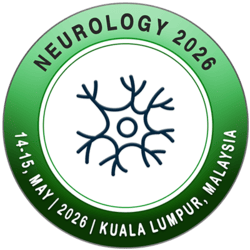Track: Neuro-Ophthalmology

Session Overview:
The "Neuro-Ophthalmology" session at the Neurology 2025 will delve deeply into the intricate and often overlooked relationship between the nervous system and visual pathways. This session is meticulously crafted for neurologists, ophthalmologists, and researchers who are eager to explore the complex interplay between neurological disorders and visual impairments. As the field of neuro-ophthalmology rapidly evolves, understanding these connections has become crucial for advancing patient care. Attendees will gain valuable insights into the latest research, including how advancements in imaging technologies, such as Optical Coherence Tomography (OCT) and functional MRI, are revolutionizing the diagnosis and management of neuro-ophthalmic conditions. The session will also explore new therapeutic approaches, including gene therapy and neuroprotective strategies, that hold promise for treating optic neuropathies and other vision-related neurological disorders. By attending this session, participants will be equipped with the knowledge and tools to improve patient outcomes in this critical area of healthcare.
Recent Developments:
Recent Developments:
Recent developments in neuro-ophthalmology have significantly advanced the field, particularly in the areas of diagnosis and treatment. High-resolution imaging techniques, such as Optical Coherence Tomography (OCT) and OCT angiography, have revolutionized the early detection of conditions like optic neuritis and glaucoma, offering unprecedented detail of retinal and optic nerve structures. Functional MRI (fMRI) has also gained prominence, providing deep insights into brain-visual pathway interactions and aiding in understanding disorders like multiple sclerosis and stroke-related vision loss. On the therapeutic front, gene therapy has emerged as a promising approach, particularly for inherited retinal diseases, offering hope for conditions previously deemed untreatable. Additionally, neuroprotective strategies and advancements in pharmacological treatments are showing potential in managing optic neuropathies and other neuro-ophthalmic disorders. The integration of artificial intelligence in diagnostics and patient care is another breakthrough, enabling more accurate and efficient detection of neuro-ophthalmic conditions, ultimately improving patient outcomes.
Sub-Tracks:
Sub-Tracks:
Visual Pathway Disorders
Investigate disorders affecting the visual pathways, such as optic neuritis and visual field abnormalities, with emphasis on diagnosis and management strategies.
Neurodegenerative DiseasesExplore the impact of neurodegenerative diseases like Alzheimer’s and Parkinson’s on visual functions, including associated visual symptoms and management approaches.
Neuroplasticity and Vision Rehabilitation
Examine cutting-edge methods in neuroplasticity to rehabilitate vision loss, focusing on innovative therapeutic approaches and their effectiveness in restoring visual function.
Pediatric Neuro-Ophthalmology
Delve into neuro-ophthalmic conditions in children, addressing developmental disorders and congenital anomalies that affect visual development and function.
Traumatic Brain Injury and Vision
Analyze the effects of traumatic brain injury on visual processing, including strategies for managing and rehabilitating vision impairments resulting from such injuries.
Neurovascular Disorders
Neuro-Oncology and Ocular Tumors
Optic Nerve Disorders
Focuses on conditions affecting the optic nerve, including optic neuritis, ischemic optic neuropathy, and hereditary optic neuropathies.
Neurovascular Disorders
Covers the impact of vascular diseases such as stroke or aneurysms on visual pathways and eye function.
Functional Visual Disorders
Examines disorders where patients experience vision problems without clear structural abnormalities, including functional blindness and non-organic vision loss.
Neuro-Oncology and Ocular Tumors
Investigates tumors affecting the eye and visual pathways, such as gliomas or meningiomas involving the optic nerve or chiasm.
Autonomic Nervous System Disorders
Addresses disorders that impact eye function through the autonomic nervous system, such as Horner's syndrome or various forms of dysautonomia affecting ocular function.
Scientific Highlights
- Neurology
- Neuro Anatomy
- Mental Health and Psychiatry
- Geriatric Neurological Disorders
- Neuromuscular Diseases
- Brain Tumor and Neuro-oncology
- Cerebrovascular and Critical Care Neurology
- Clinical Neurophysiology
- Central Nervous System
- Neuro-Ophthalmology
- Pediatric Neurology
- Neuroimaging and Brain Mapping
- Neurogenetics and Neurodegenerative Disease
- Behavioral and Cognitive Neuroscience
- Neurochemistry and Neuropharmacology
- Spinal Neurosurgery and Neural Transplantation
- Neuro Robotics and Neuro Modulators
- Addiction and Adult Psychology
- Brain Stimulation and Computational Neuroscience
- Neural Control of Micturition
- Parkinson's Disease


